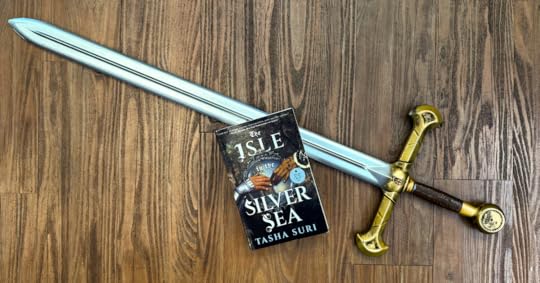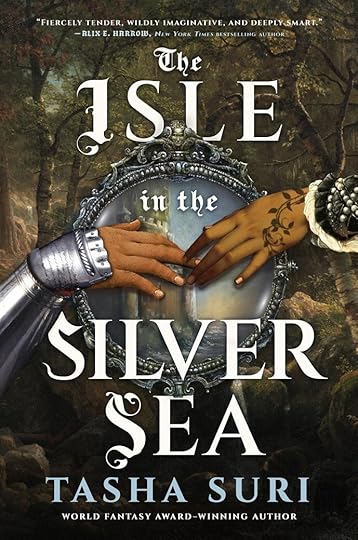Timeless Tales: An Interview with Tasha Suri

Resident fantasy expert and co-host of our Fantasy Readers Guild book club, Rachel Randolph, knows a great fantasy book when she reads one, and she has been dying to share Tasha Suri’s latest novel with you for months. She says, “The Isle in the Silver Sea completely reshaped my idea of the power fantasy has to shape a story and speak to the current state of the world.” A ringing endorsement if we’ve ever heard one! Thank you to Tasha and Rachel for this interview — enjoy!
 Tasha Suri | Photo Credit: Shekhar Bhatia
Tasha Suri | Photo Credit: Shekhar BhatiaRachel Randolph: The Isle in the Silver Sea takes the reader headfirst into a fantastical version of England, where folklore and legends shape a person’s fate, which in turn shapes the nation’s fate. How do you approach worldbuilding when blending historical with mythical?
Tasha Suri: The historical has so often been given mythical treatment by historians, past authors, and propagandists, that it made my job much easier! I knew I wanted the Isle to be time-wobbly, porous and strange, so when I drew on a particular piece of history or historical person I tried to look at the myths and fables that surrounded them. For example, in The Isle in the Silver Sea there is an Eternal Queen. Victorian writers made a myth of Elizabeth I, and many people have since followed suit, so it was easy to build a timeless queen using the tales that have been told about her. The delicious thing about knights or even witches is that they have a historical reality but also a mythical reality. A knight is honourable, pure, chivalrous. A knight is also a soldier, an instrument of the state, bound to the dubious power of others. I loved tangling those two strands together.
RR: On Instagram, you offered some context for the anger that drove you to write this book, citing the Windrush scandal and the erasure of historical documents to control a culture. You worked this idea into the start of each chapter with political documents under review. How does that structure lend itself to this story? What was it like writing the excerpts?
TS: The excerpts were one of the last things I wrote, but also the easiest. Archives are core to the story, just like they are to history and to politics. What we choose to remember, to record, to preserve, shapes the future’s perception of the present. I first learned that when I was researching the 18th century for another story I was working on, and was confronted with how much hadn’t been archivally preserved about immigrant communities that had absolutely, definitively existed. I always wondered what we’d lost: the letters, the oral storytelling, the pamphlets. In The Isle in the Silver Sea, I decided if the State was going to control what people could say or read, well—I wanted to show what the State destroyed! So the excerpts are little voices that expand the world of the Isle, for readers who want to delve a little deeper.
RR: Yearning romantic subplots are often sought after by readers as a form of escapism, especially in brutal political times. In this book, you give readers the (perfect!) yearning they crave, but build it on top of a story about the very horrors they might be trying to “escape”. What do you think about reading for escapism in a time when fascism is on the rise and book bans are increasingly popular?
TS: I think ignoring fascism and ignoring the state of the world are a privilege not all of us are afforded. But there’s a difference between ‘ignoring’ and giving yourself time to breathe and recover your strength before you dive back into the political waves. Reading for escapism can be a kindness to yourself and a respite. I also think escapism is built on what we as people find safe or freeing—which are inherently political concepts! The Isle in the Silver Sea is a story of queer love and queer family, and that’s escapism, but I hope it’s the kind of escapism that replenishes the soul.
RR: What are the benefits of using the fantasy genre to tell a story with allusions to modern political issues?
TS: I’m not sure fantasy has any benefit over any other genre, when it comes to engaging with modern political issues. It’s just the way I find it easiest to express how I feel. There are authors who know how to speak about assimilation and nationalism directly. I find it easier to talk about it all through the medium of ink, tales, magic. Maybe fantasy allows you to use big metaphors to express how it all feels—-the grief, the joy, the desire for something better, the fear of the dark pit of a bad political path.
RR: Do you find that the publishing industry supports work that challenges the status quo? Did you face any hardships in getting this story out there?
TS: I’m lucky to have a supportive publishing team that understood what I was trying to do. I think the publishing industry is inherently interested in money, which means it can be regressive and traditional and focused on stories that uphold the status quo, sure. But there are also people doing interesting work across the industry. I know I’ve been lucky to have worked with a number of BIPOC editors who advocated for me, as have many other wonderful people I’ve been lucky enough to work with.
RR: Were there any characters or scenes you loved that you had to cut from the novel? How does editing shape a novel, compared to how it can shape political “truths”?
TS: There wasn’t much I had to cut, I was very lucky! Sometimes I wish I could have written a little from the perspective of the cat Mal, if I’m honest, but it would have derailed the novel a little. (She’s just so cute.) As for editing—I think editing fiction is hopefully about making the novel sing more true. It’s about making the message within—the themes and politics of the novel—shine more brightly.
RR: What novels or works served as points of inspiration for The Isle in the Silver Sea ?
TS: Absolutely Witches Abroad by Terry Pratchett, although I don’t have his wonderful humour! I was also inspired by Mythago Wood. Their treatment of the power of stories really spoke to me. I also drew on Arthuriana as an inspiration, from Le Morte d’Arthur to Chrétien de Troyes. The poem La Belle Dame Sans Merci also features heavily, and The Faerie Queene. And finally, the anime Sailor Moon. You have that to thank for part two of the novel.
RR: And finally, do you have a favorite memory from time spent in an independent bookstore?
TS: When I was a young teenager, I went to Gay’s the Word for the first time, a famous, longstanding LGBTQ+ independent bookshop in London. As a young queer woman that store, its tender and thoughtful curation, and its bookselling team, were a revelation and a lifeline for me. I had never felt so welcome among books. Every time I go into an independent bookshop I’m reminded of how thoughtful curation and bookselling can create a space that changes lives.
The Isle in the Silver Sea is on our shelves now!Ann Patchett's Blog
- Ann Patchett's profile
- 27679 followers




